Dyson V15 Detect review – I'm a vacuum tester and this is simply one of the most powerful on the market
Here's how the Dyson V15 Detect performs cleaning dust, large debris and hair on all surfaces
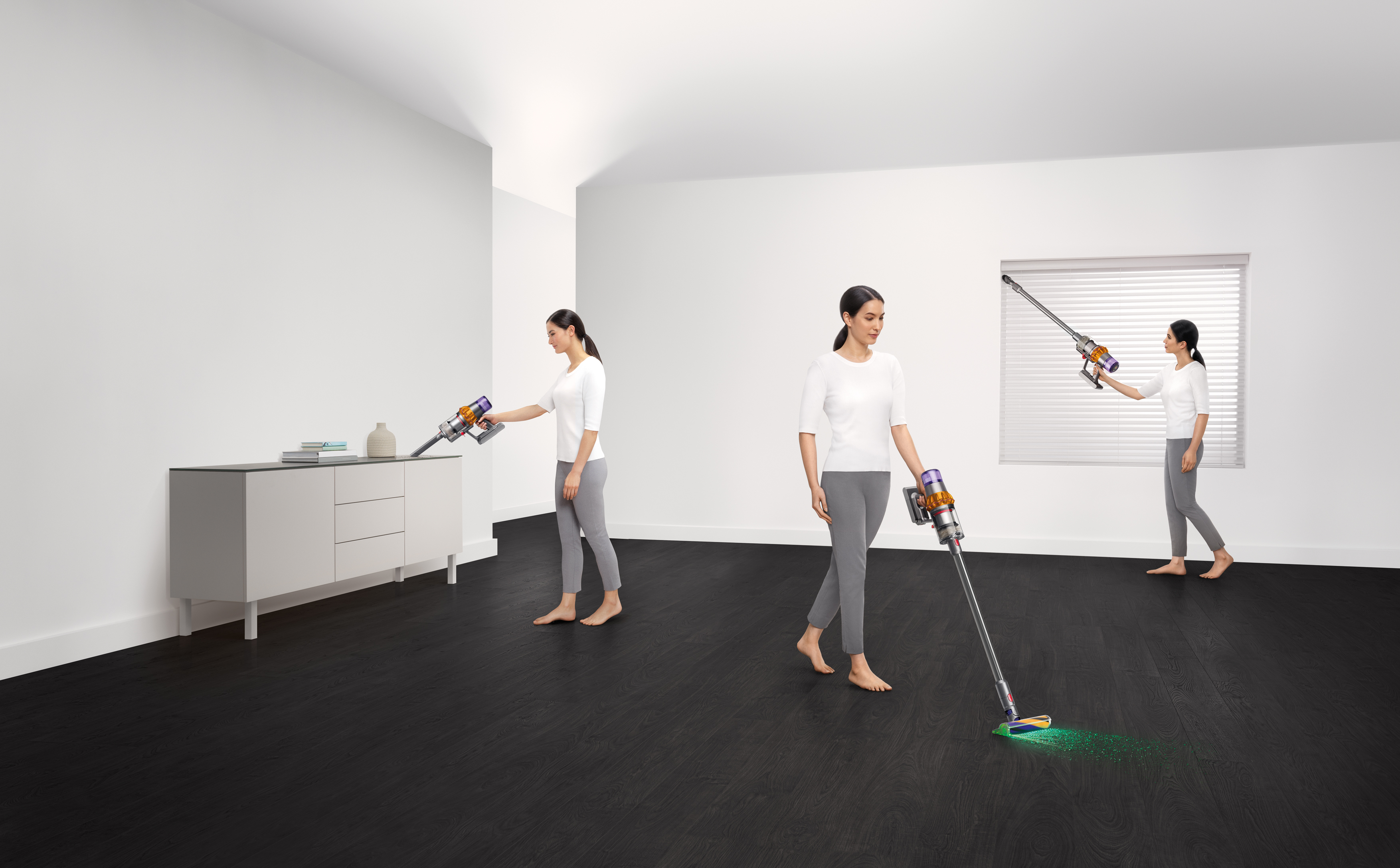

Carpets, hard floors, pet hair, dust – the Dyson V15 Detect has no issue whatsoever vacuuming it up. It cleans flawlessly on every surface, boasting the suction power you'd find in a massive, corded vacuum but packaged into this easy-to-use cordless stick with intelligent features that reveal dust the naked eye can't see.
-
+
+ Flawless suction on all surfaces
-
+
Lightweight
-
+
Easy to maneuver
-
+
Genuinely reveals invisible dust
-
+
Automatically adjusts suction power when needed
-
+
Easy to clean
-
-
Expensive
-
-
Occasional delay on the Digital Motorbar brushroll spinning
You can trust Homes & Gardens.
As far as vacuum brands go, Dyson is widely recognized as one of the best. After all, they are the ones who invented the bagless vacuum and the cyclone engineering that puts their lineup in a league of their own.
The V15 Detect is part of Dyson's flagship 'Detect' series, and has spent a great deal of time topping our guides of the best cordless vacuums and best vacuums for pet hair for good reason. It's a relentless cleaner packaged into a lightweight, easy to use cordless stick – and it has no trouble vacuuming any type of mess.
I've retested the Dyson V15 Detect with our recently new-and-improved testing methodology to see how it fares against vacuums that have been released since. I tested it in a local pet shelter, our dedicated test center and in my own home for weeks to see exactly what it's capable of.
Dyson V15 Detect: Specifications
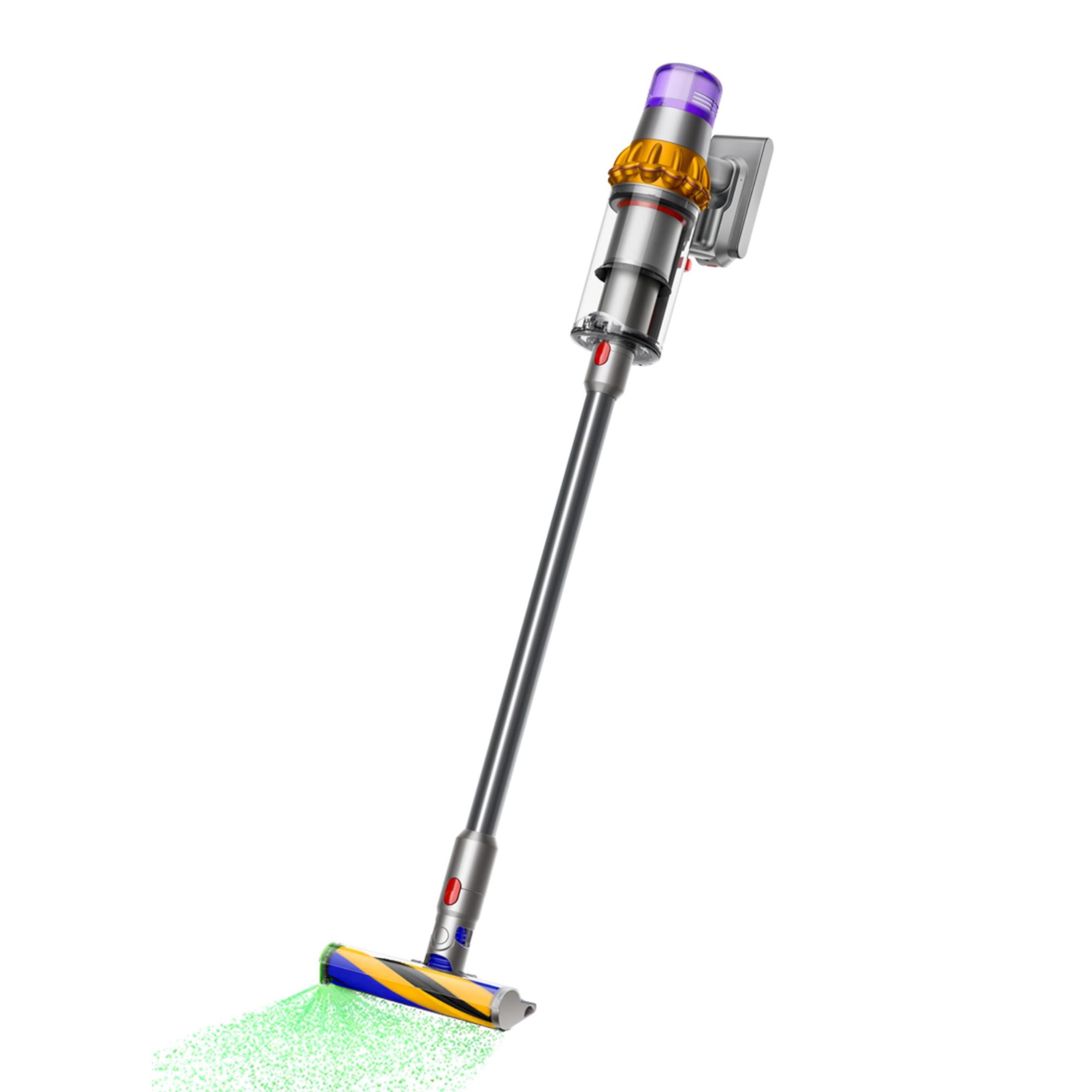
| Type | Cordless |
| Suction power | 240 air watts |
| Runtime | Up to 60 minutes |
| Charge time | 4.5 hours |
| Suction modes | 3 (auto / eco / boost) |
| Filter | Whole-machine HEPA filtration |
| Dust capacity | 0.2 gallon |
| Weight | 6.83 pounds |
| Dimensions | 49.6H x 10.5L x 9.8W inches |
Dyson V15 Detect: Unboxing and setup
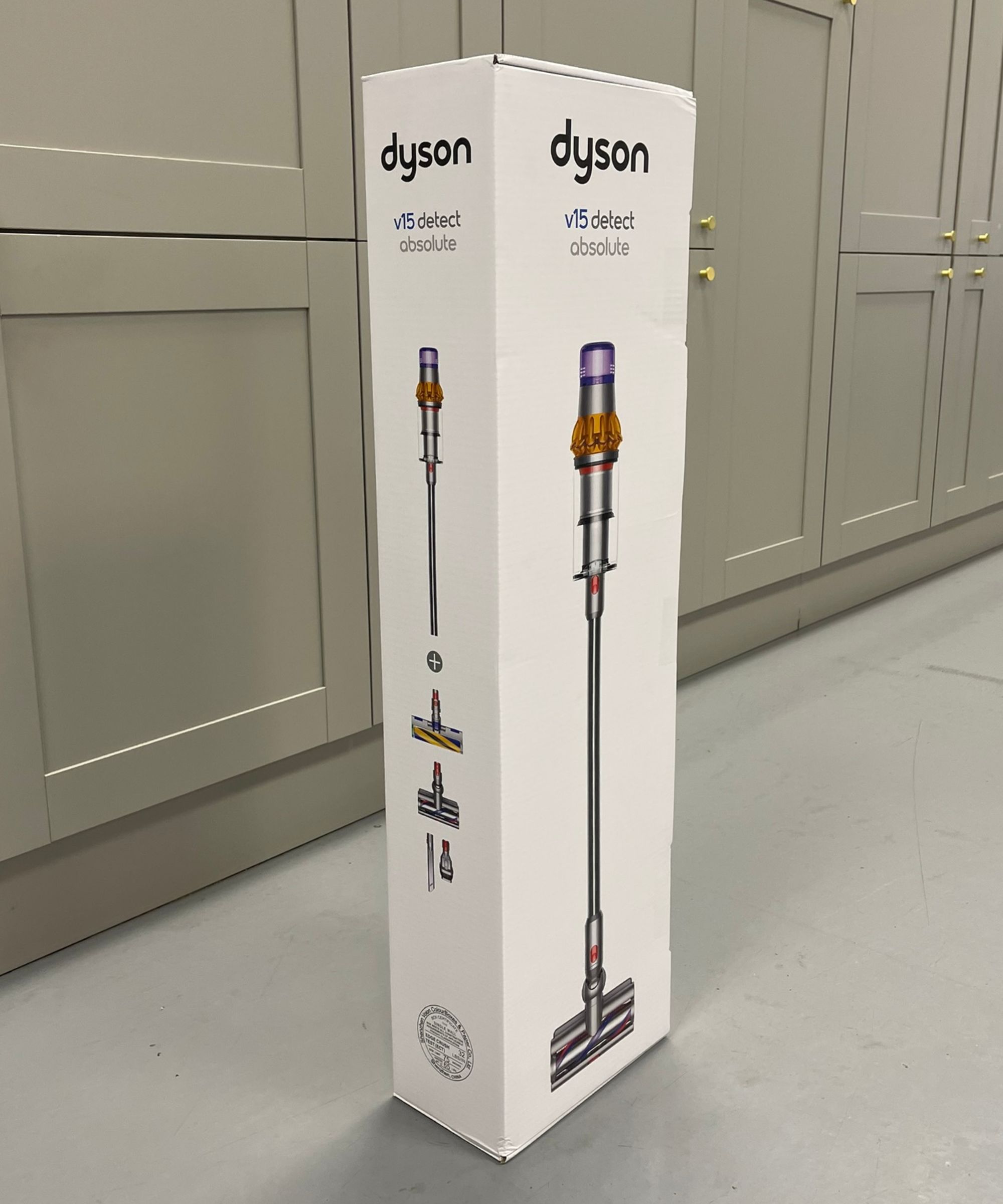
The box is free of any plastic packaging
Dyson package the V15 Detect in a plastic-free box, using folded cardboard and paper to organize and protect each part. It's a compact box and not too heavy, and it doesn't take long before everything is unboxed and ready to use.
It's often recommended to fully charge appliances before you first use them as it ensures the optimal battery life. My V15 Detect started at 35% and took around three hours to fully charge to 100%. You can plug the vacuum directly into the vacuum or dock it to the attachable wall mount, which screws in so it isn't a renter-friendly tip for storing.
Mine was the UK-available Dyson V15 Detect Absolute, which includes: the Digital Motorbar floorhead, Fluffy Optic floorhead, combination tool, crevice tool, and wall dock.
The US-available Dyson V15 Detect Absolute includes the same floorheads, combination tool and wall dock, but its crevice tool is built into the wand with an extendable dusting brush, and it also comes with a hair screw tool that can pull hair and fur from upholstery.
Read through our vacuum jargon buster if any of these terms sound unfamiliar.
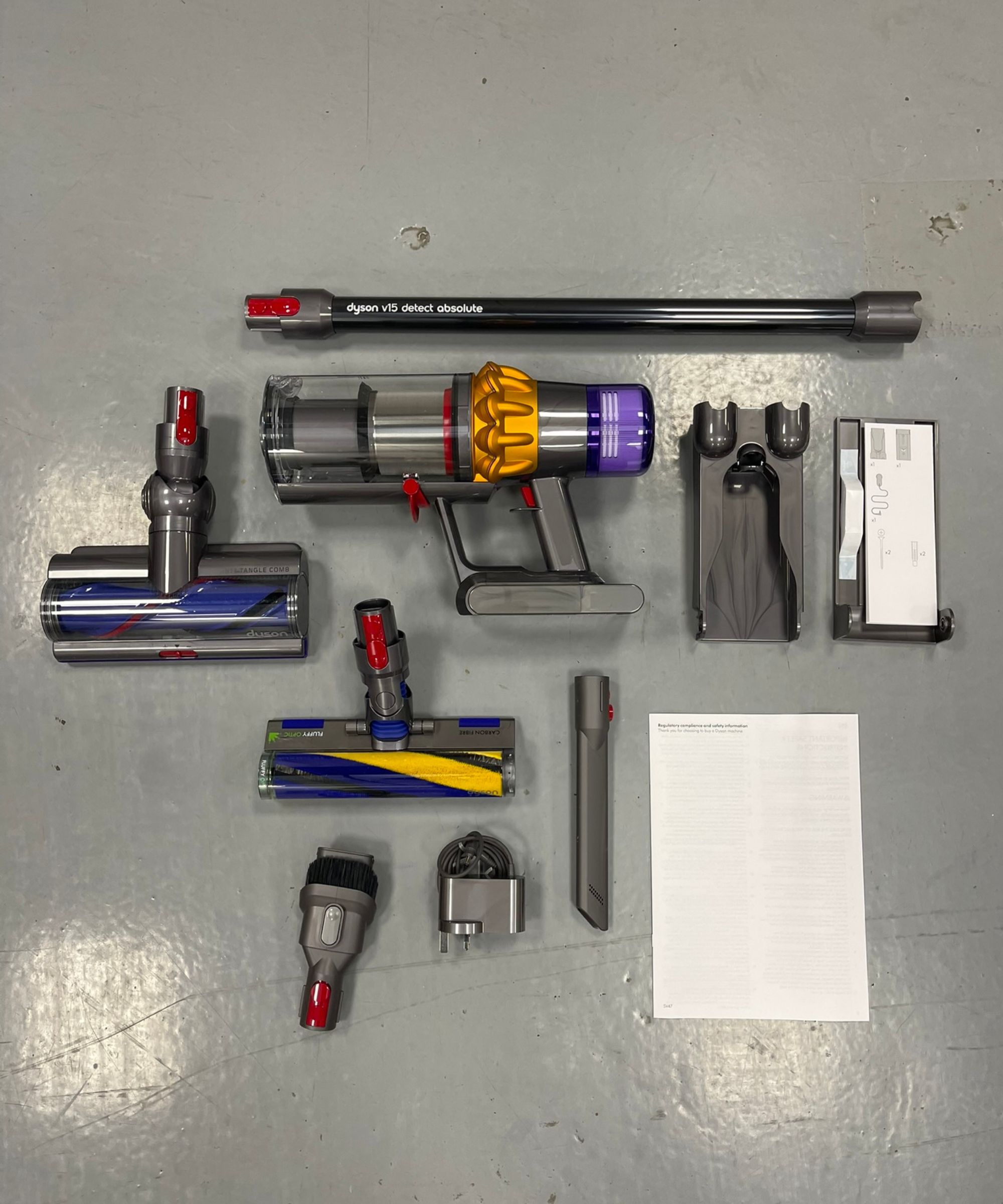
Everything included with the Dyson V15 Detect Absolute
Dyson V15 Detect: Design and features
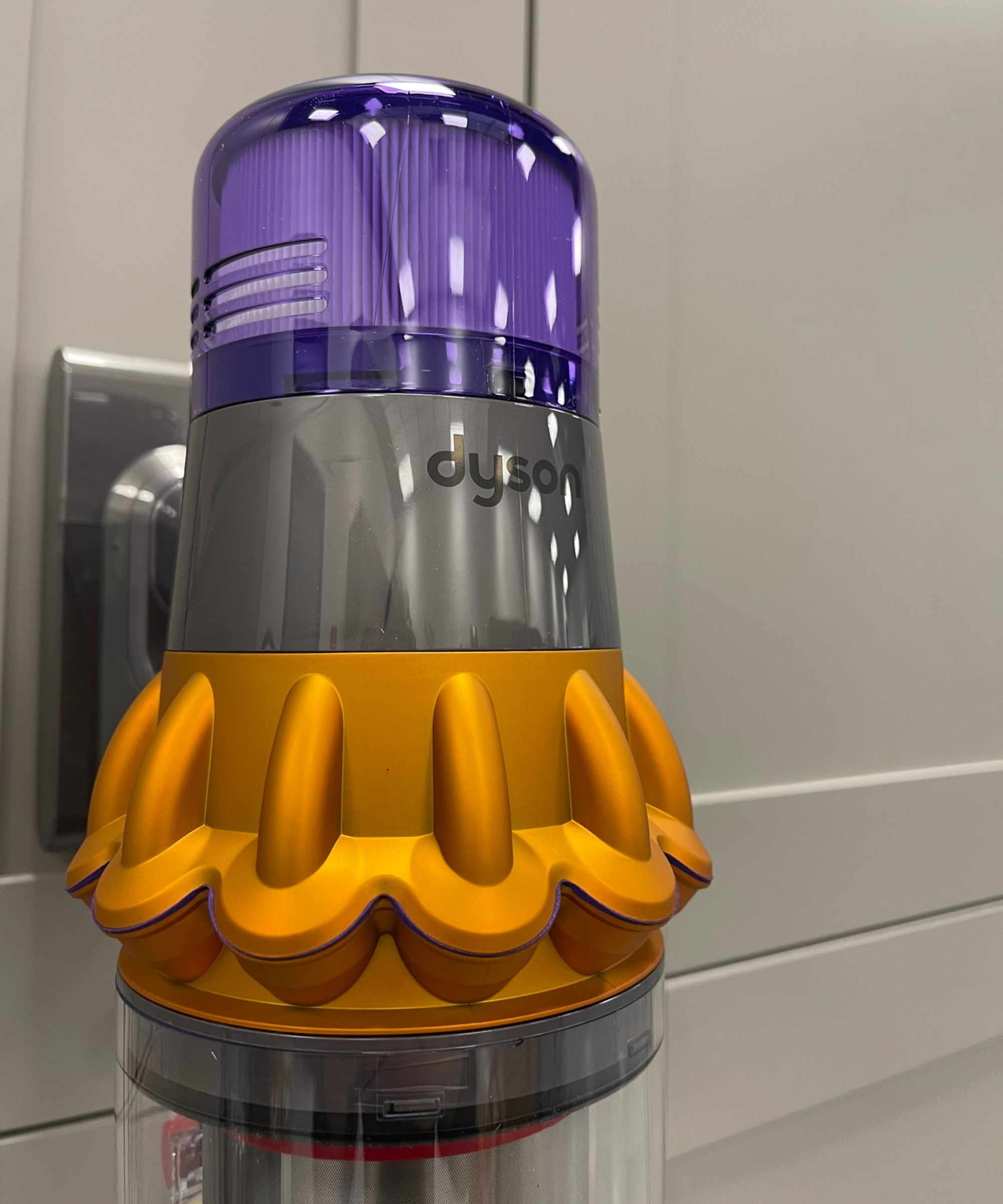
The Dyson V15 Detect uses 14 cyclones to deliver 240 air watts of suction – making it as powerful as many corded vacuums
The V15 Detect uses sensors to identify the floor you're vacuuming and how dusty it is. If it senses that the floor's particularly dirty or that you're vacuuming carpet, it'll increase the suction power to make sure everything's picked up. This is when you're using auto mode; eco mode keeps it at the lowest suction, and boost mode keeps at its highest.
It also has a green diode laser that reveals dust that the naked eye can't see. This is really what makes the Dyson Detect vacuums worth it, as other vacuums aren't able to truly show you whether the floor is clean. It's almost alarming how much it reveals that we can't see.
The V15 Detect comes with two floorheads: the Digital Motorbar and the Fluffy Optic. The Fluffy Optic is designed for hard floors, as its soft brushroll is able to pick up super-fine dust particles without scratching delicate surfaces, making it one of the best vacuums for hardwood floors.
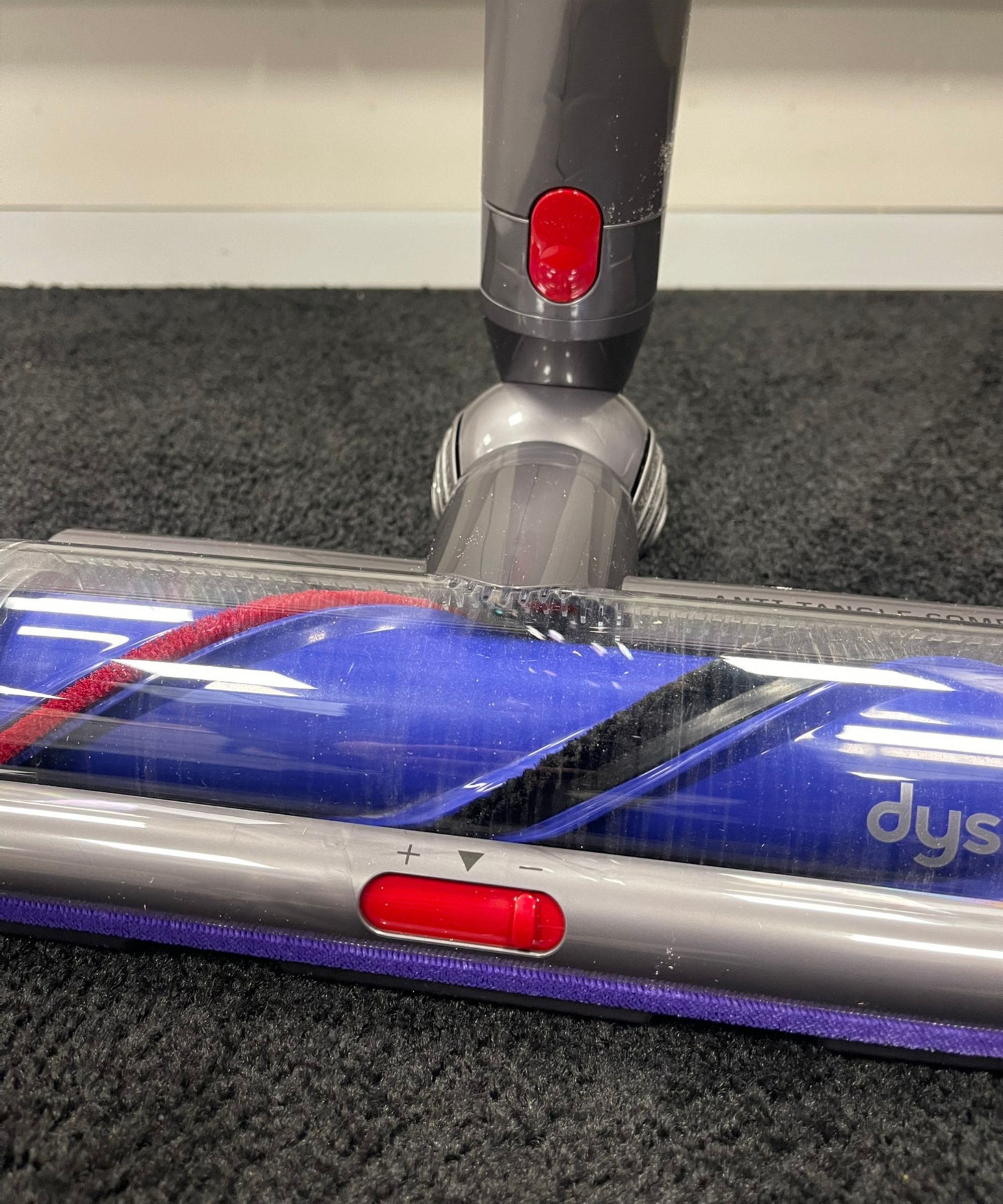
The Digital Motorbar floorhead can be used on any surface but cleans best on carpet
The Digital Motorbar floorhead can be used on carpets or hard floors, but its de-tangling, bristled vanes make it best-suited to vacuuming pet hair and carpets. You can find this floorhead across a few of Dyson's cordless vacuums but the one used on the V15 Detect has an added power adjuster and bumpers to avoid scratches.
And, also similarly to many other Dysons, the V15 Detect uses whole-machine HEPA filtration to capture all the common allergens as well as general household dirt. The best HEPA vacuums are great for allergy sufferers as they capture 99.97% of the particles that trigger symptoms.
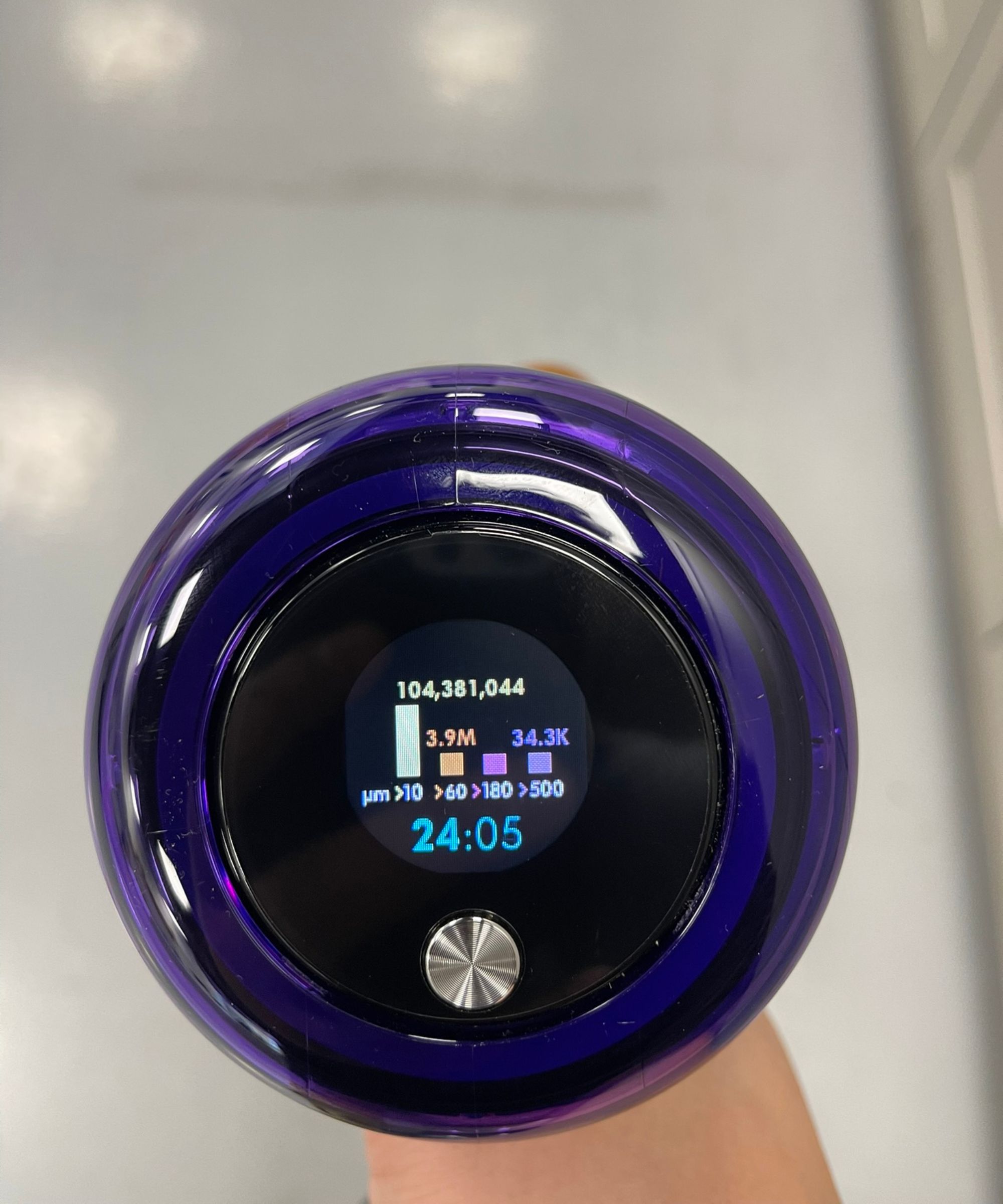
Every particle that's vacuumed is counted, down to the particles' individual sizes in microns
These particles are also counted down to their individual size (a HEPA vacuum filter can capture particles as small as 0.3 microns), which shows you which areas in your home tend to be the dirtiest. This isn't the most essential feature but it does help to show when you've fully finished tasks like vacuuming the mattress or cleaning furniture.
And like almost all cordless vacuums, the V15 Detect can be transformed into a handheld vacuum by detaching the wand and attaching any of the attachments to the vacuum.
What is the Dyson V15 Detect like to use?
As you can see in the video above, the green diode laser really does highlight invisible dust. It's been a game-changer using this technology at home (which is mostly hard floors), as beforehand I was missing so much on the floors. It also shows how well this vacuum really cleans, as there's never any remaining dust after I've passed over an area once.
I've been using the Dyson V12 Detect Slim as the primary vacuum in my home for the better part of a year. That's the step-down from the V15 Detect in terms of size, power and price, and I definitely noticed the increase in weight when using the V15 Detect – but I think this is more of a reflection of how the V12 Detect Slim is one of the most lightweight vacuums out there. I also noticed how much more powerful the V15 Detect is in comparison.
The V15 Detect can lay almost 180 degrees flat. When you tilt it from side to side, the floorhead bends naturally in the same direction making it easy to maneuver around furniture and tight spaces.
I go into more detail below but the V15 Detect really is one of the best vacuums ever made. It vacuums almost everything in a single pass, adjusting the suction power in under a second when it detects that it needs to. It also cleans edges incredibly well, and the only time I had to use the crevice tool was when vacuuming the edges of a low-pile carpet.
The only minor drawbacks are that the brushroll on the Digital Motorbar floorhead can sometimes take a couple seconds to start spinning, a counter-intuitive design feature as the vacuum is operated using a trigger, meaning you'll likely be doing quick bursts every now and again.
The battery life is also only 60 minutes long if you're on eco mode and not using a non-motorized attachment (so, not the floorheads). On auto mode with the normal floorheads, you're looking at around 42 minutes, depending on how dirty the floors are and how much carpet you're vacuuming.
Test 1: Flour and sugar
I vacuumed a cup of flour and sugar on hardwood, linoleum and carpet flooring to assess how well the vacuum could handle fine powders at large volumes. This is a great visual test, as we can see where flour gets stuck inside the vacuum, and these substances are great proxies for dust and dead skin.
The V15 Detect vacuumed all the flour and sugar in a single forward pass. Usually, vacuums struggle to pick up residue between the wooden panels and will often push the powders into clumps, but the vacuum left nothing behind.
Also, the soft brushroll wasn't covered in flour, which is usually the case for other vacuums during this test. The only visible flour was inside the dustbin and attached around the filter.
Again, on carpets the V15 Detect vacuumed it all in one pass. The vacuum was so strong that it suctioned itself to the carpet, which is common for one of the best upright vacuums but rare to see in a cordless. This explains why Dyson added a power adjuster to this floorhead, as the best multi-surface vacuums must be able to increase and decrease the suction to glide smoothly on different surfaces.
Test 2: Pantry
I tested a cup of cereal and red lentils to assess the V15 Detect's performance with larger debris. These common household messes have varying textures, too. Many vacuums struggle to vacuum cereal if it can't crush it down first, and lentils stick easily to certain hard floors and are easy to fling around.
Using the Fluffy Optic's soft roller on hard floors, the V15 Detect actually crushed down the cereal and vacuumed all the pieces easily. I've actually never seen a soft brushroll do this before, and as nothing was scattered across the room, this is the best cleaning performance I've seen.
On carpets, the Digital Motorbar floorhead crushed the cereal pieces down providing a bit of resistance, but almost everything was vacuumed in one pass. A few lentils fell out of the floorhead but were then vacuumed up.
Test 3: Pet hair
I tested the Dyson V15 Detect in a local pet shelter, Bristol Animal Rescue Centre, to find out how well it can handle large amounts of cat and dog hair, as well as the messes that come with high foot traffic.
Their usual cleaner had been off for a couple of weeks, so the floors, rugs and entrance mat were all in need of a clean. When vacuuming a thick rug, it handled all messes – mud, fur, dirt, and small rocks – as soon as the vacuum touched them.
I found a similar performance when cleaning the high-friction entrance barrier mat. This is one of the toughest surfaces I test on, and while the V15 Detect wasn't able to vacuum all the hair, it got as much as some of the vacuums from our best Miele vacuum tests, that cost hundreds more and are corded canister models. After three minutes of cleaning this section, the vacuum had picked up more than 432 million particles.
On every carpet I vacuumed using the Digital Motorbar floorhead, the hair was pulled up easily and without any hair wrap whatsoever. I'd filled the dustbin of pet hair twice during these tests, and by the end there wasn't a single hair stuck in the brushroll:
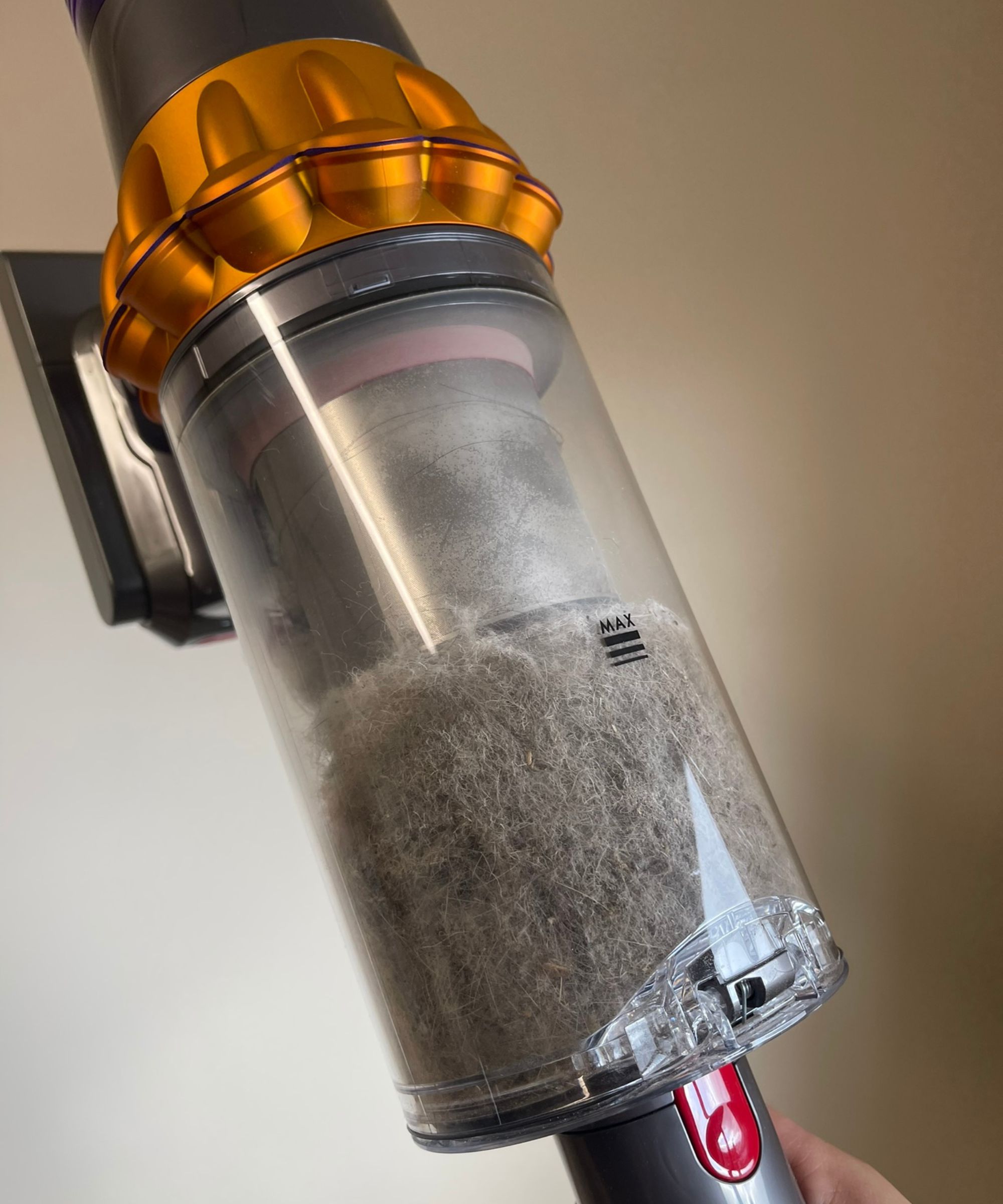

And vacuuming hard floors with the Fluffy Optic floorhead is just as effective. The green laser revealed plenty of small dog hairs that I otherwise wouldn't have seen, and then showed that they'd been vacuumed once I pulled back again.
Test 4: Attachments
I tested the combination tool and crevice tool both at the test center and in the local pet shelter.
Both tools work just as you'd expect from the vacuum attachments included in any cordless model. The combination tool is essentially a dusting brush and upholstery tool, with a small, high-friction rubber pad to loosen dirt that's attached to furniture. I found this works fairly well, but I've seen better performances in other, more dedicated attachments.
When using the crevice tool, you can see dust and small debris being pulled in from an inch or two away, and when dusting, the brush lightly picks up the fine particles allowing the strong suction to clear them away.
The hair screw tool that's included in some models is one of the best attachments for pet hair I've ever used, and if that's included in your set, you won't need to use the combination tool very often.
Dyson V15 Detect: Cleaning and maintenance
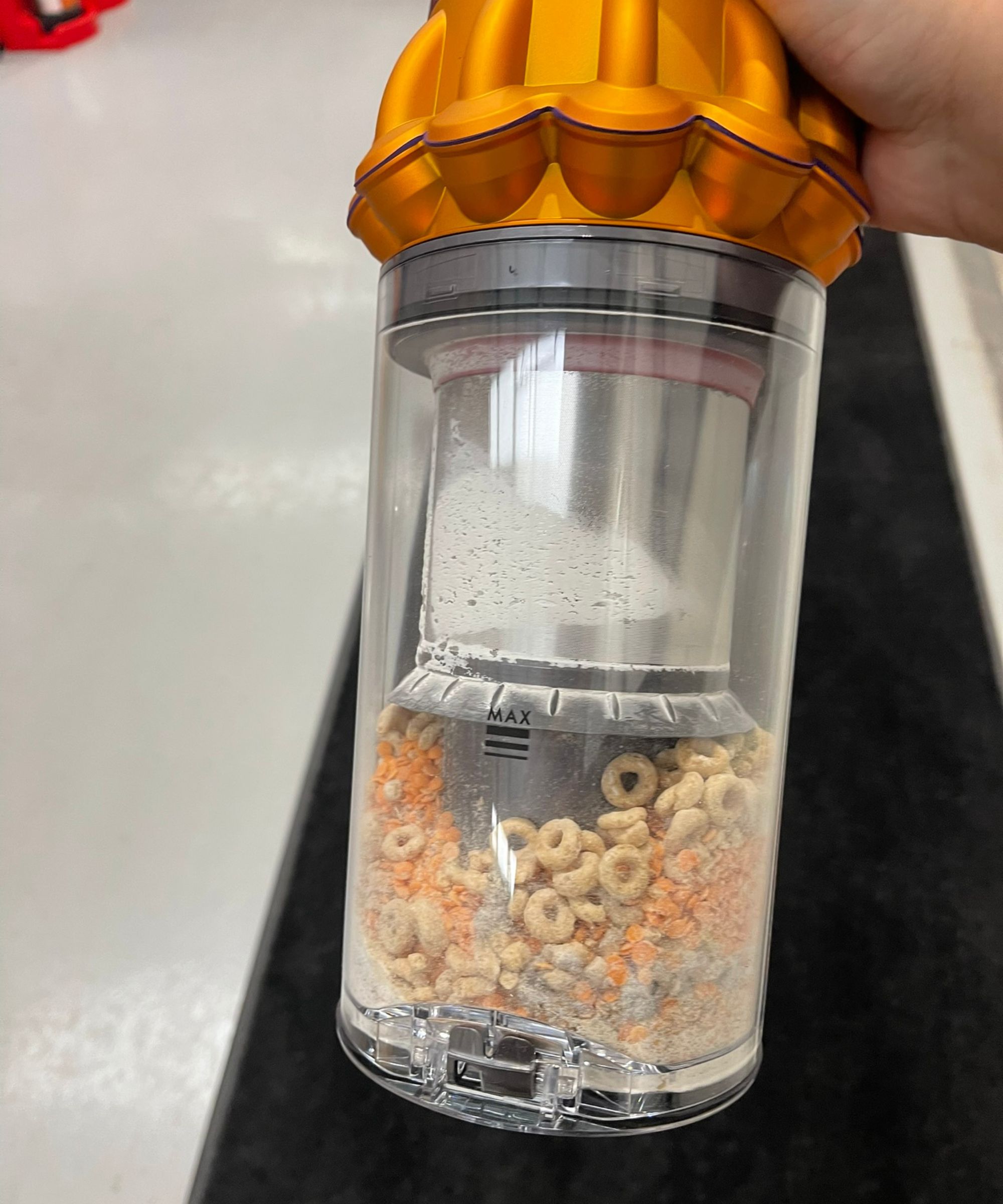
Push the red lever and the dustbin swings open
The Dyson V15 Detect is as easy to clean as any cordless vacuum (it's one of the reasons they're so convenient). The dustbin is opened using a red lever that dramatically drops the contents into the trashcan, and if anything's stuck, you can re-press it and the rest will fall out.
And when it comes to cleaning the vacuum, the V15 Detect is straightforward to take apart. Each non-electrical component can be rinsed or washed, and the others can be wiped and brushed clean using cleaning tools you likely have at home.
You can also wash the post-motor filter, something that Dyson recommends you do once a month. This will preserve its lifespan and maintain the best performance, but you can get away with cleaning the vacuum filter once every six months or so.
How does the Dyson V15 Detect compare?
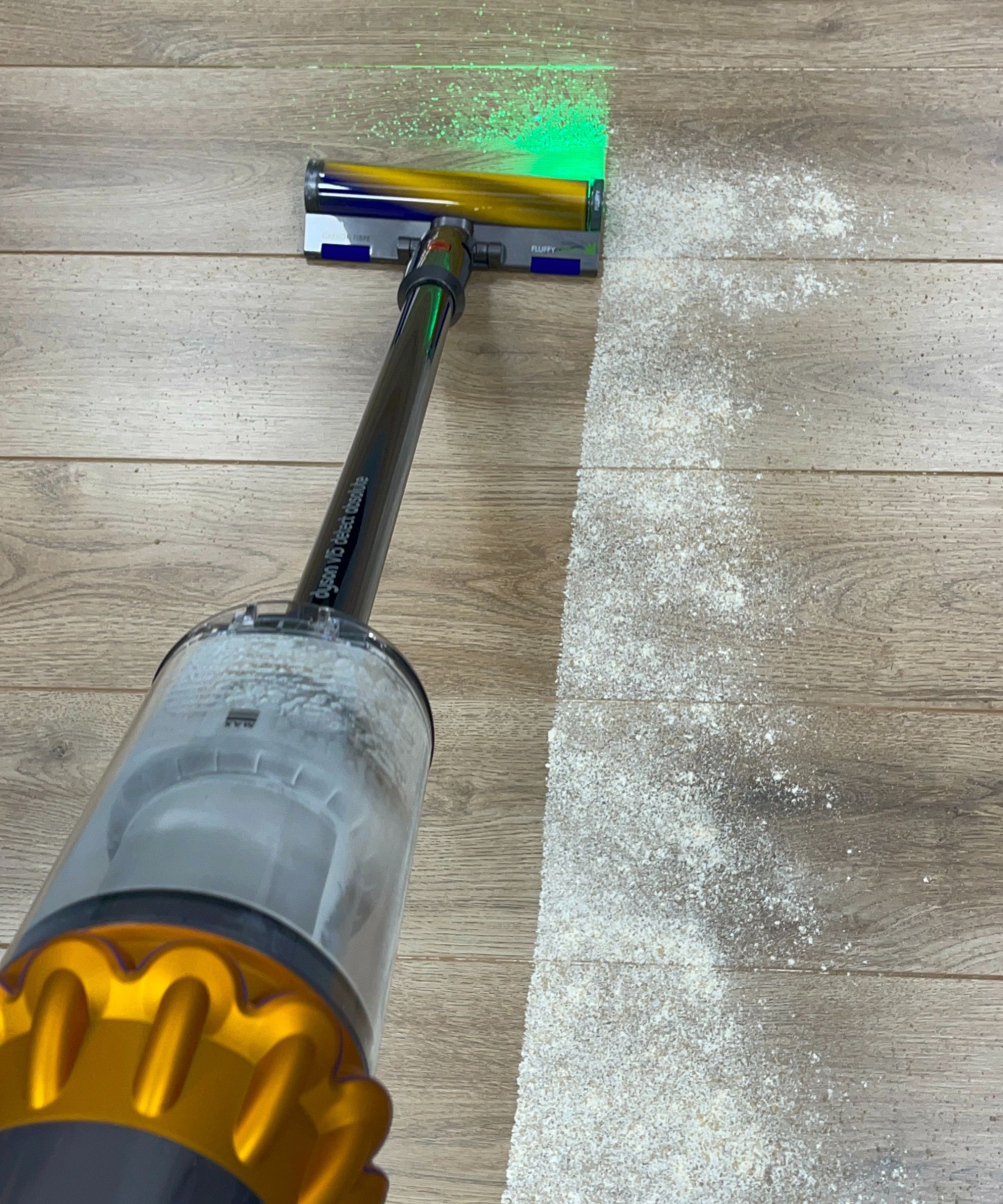
The V15 Detect is one of the best vacuums we've ever tested, but it's not cheap
There's a reason the Dyson V15 Detect tops so many of our vacuum guides. The only vacuum that performs better is the Dyson Gen5detect, but as it costs $200 more just for a slight increase in suction power, the V15 Detect gets our vote.
Sure, this suction power can be found in our best-on-test upright vacuums like the Shark POWERDETECT or the Dyson Ball Animal 3, or an expensive canister vacuum like the Miele Blizzard CX1, but the benefit of a cordless vacuum is usually its ease of use and convenience at the sacrifice of corded power. The V15 Detect delivers the suction power you'd expect from a massive machine in a cordless stick that you can even hide while storing it.
But at $750, it isn't cheap. You can look out for vacuum deals (and I've seen the V15 Detect discounted to $450 during sale seasons), but it's still a big investment worth considering. You can always opt for the Dyson V12 Detect Slim which is $100 cheaper, and shares almost all the same features except for a smaller dustbin and lower suction power. Or, the Shark Cordless PowerDetect costs under $400, and while it isn't as powerful, it still works great on all floor types.
Should you buy the Dyson V15 Detect?
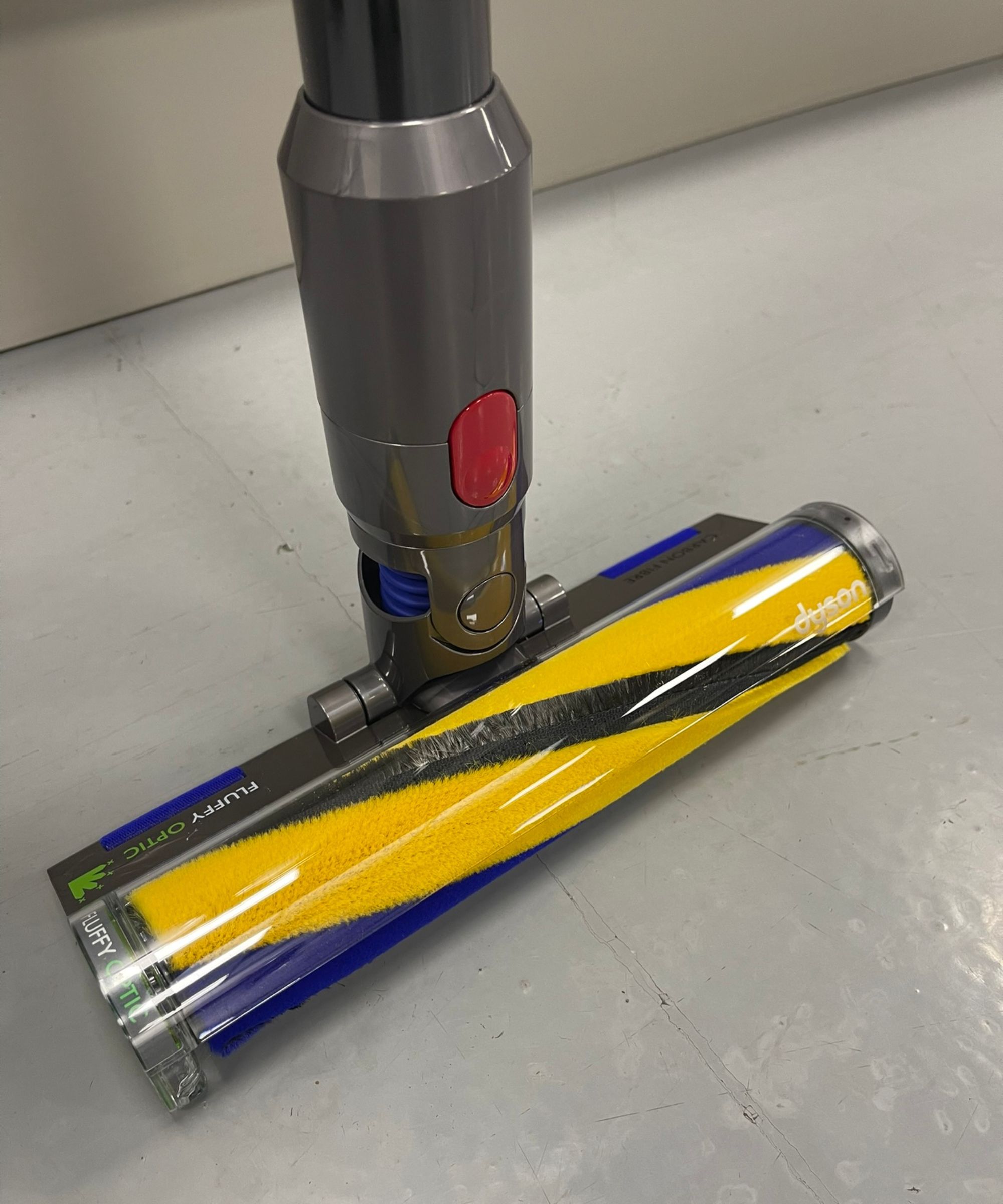
The Fluffy Optic floorhead reveals invisible dust
If you can afford it, yes. The smart tech in this Dyson vacuum has genuinely transformed how easy it is for me to clean my home, and no mess ever gets left behind now that I can see exactly what's on my floors. It's a gamechanger owning a vacuum cleaner that can pick everything up in one pass.
But even though choosing the right vacuum cleaner involves treating it as the investment it is, $750 is still a lot of money to part with. If it's too pricey, consider waiting for it to be discounted (which is fairly often), or see if you can find a solid refurbished Dyson for cheaper.
Or, if you're on a budget, check out our tested guide of the best Dyson alternatives.
Sign up to the Homes & Gardens newsletter
Design expertise in your inbox – from inspiring decorating ideas and beautiful celebrity homes to practical gardening advice and shopping round-ups.

Dan is the Home Tech Editor for Homes & Gardens, covering all things cleaning, smart home, sound and air treatment across the Solved section. Having worked for Future PLC since July 2023, Dan was previously the Features Editor for Top Ten Reviews and looked after the wide variety of home and outdoor content across the site, but their writing about homes, gardens, tech and products started back in 2021 on brands like BBC Science Focus, YourHomeStyle and Gardens Illustrated.
They have spent more than 200 hours testing and reviewing vacuums for Homes & Gardens, and have even visited Dyson's engineering labs for the full low-down of the ins and outs of our trusty cleaners.
Dan has a BA in Philosophy and an MA in Magazine Journalism. Outside of work, you'll find them at gigs and art galleries, cycling somewhere scenic, or cooking up something good in the kitchen.
You must confirm your public display name before commenting
Please logout and then login again, you will then be prompted to enter your display name.
-
 Barack and Michelle Obama's neutral accent chair is the perfect living room focal point – you can recreate their serene style in any-sized home
Barack and Michelle Obama's neutral accent chair is the perfect living room focal point – you can recreate their serene style in any-sized homeThis designer-approved essential fits into every modern living room – it's beautiful enough to stand alone, while pairing well with your favorite cushion
By Megan Slack Published
-
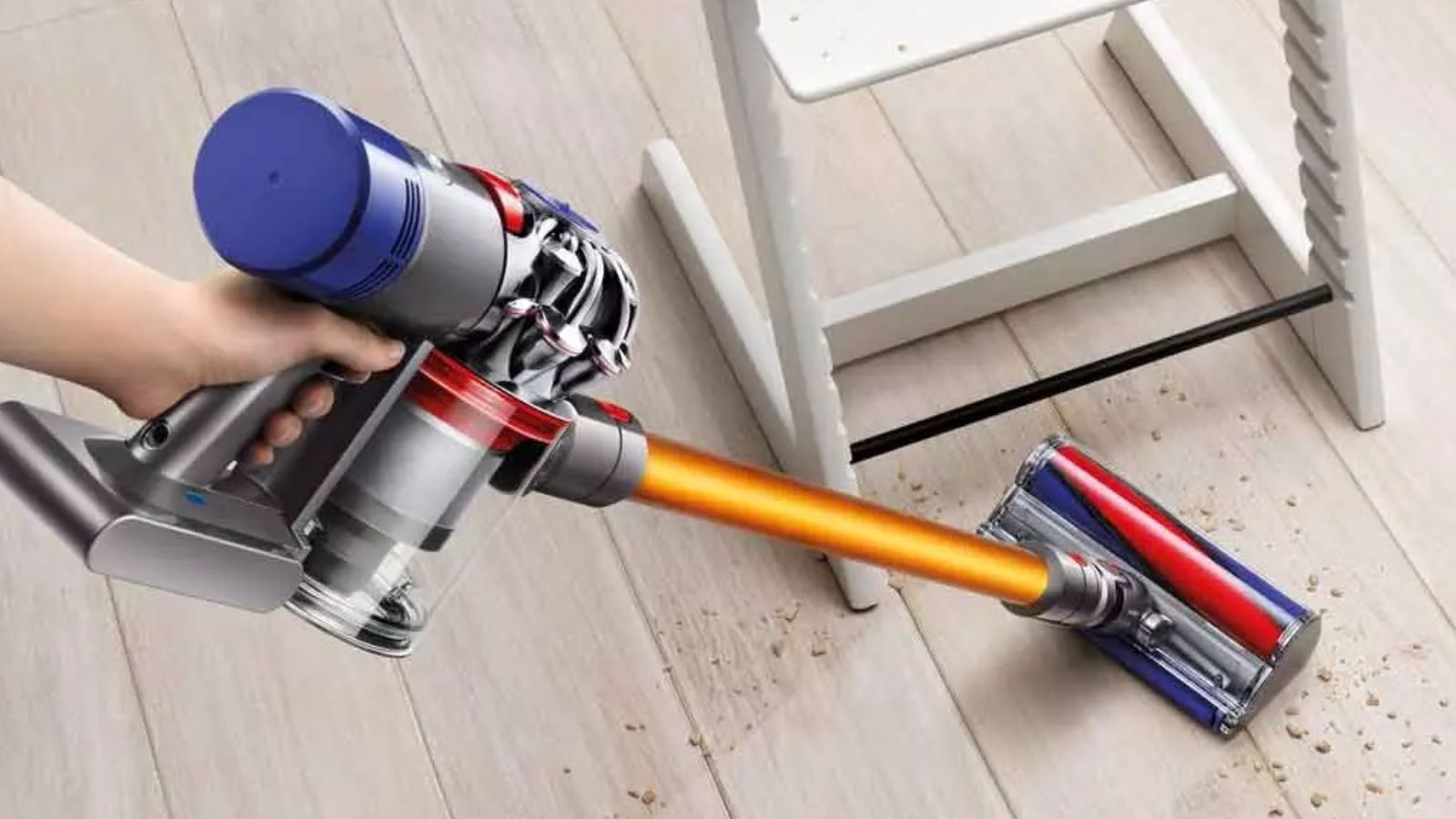 A $170 limited-time discount makes this the most affordable Dyson cordless vacuum on the market right now
A $170 limited-time discount makes this the most affordable Dyson cordless vacuum on the market right nowYears after its release, the Dyson V8 still impresses us with its features and power
By Dan Fauzi Published
-
 Victoria Beckham has a unique formula for perfect bedding: 'Very expensive sheets and cheap pillows' – you can follow her example from $15
Victoria Beckham has a unique formula for perfect bedding: 'Very expensive sheets and cheap pillows' – you can follow her example from $15Victoria revealed she goes for crisp, white bed sheets and pillows with neck support from Target – and you can shop similar buys at an ultra-low cost
By Hannah Ziegler Published